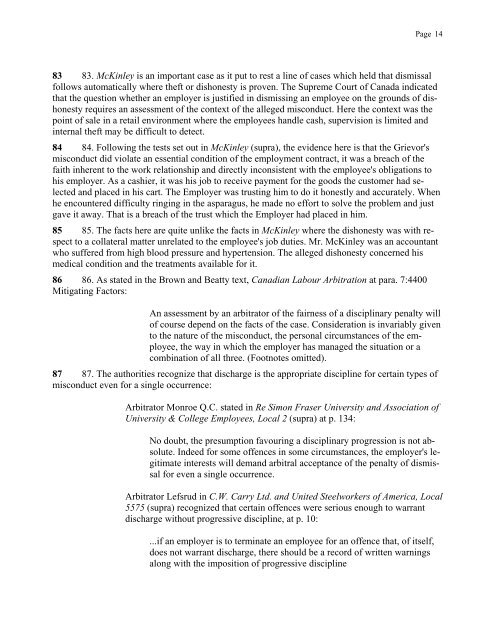FAQ's Cases - Stewart McKelvey
FAQ's Cases - Stewart McKelvey
FAQ's Cases - Stewart McKelvey
- No tags were found...
Create successful ePaper yourself
Turn your PDF publications into a flip-book with our unique Google optimized e-Paper software.
Page 1483 83. McKinley is an important case as it put to rest a line of cases which held that dismissalfollows automatically where theft or dishonesty is proven. The Supreme Court of Canada indicatedthat the question whether an employer is justified in dismissing an employee on the grounds of dishonestyrequires an assessment of the context of the alleged misconduct. Here the context was thepoint of sale in a retail environment where the employees handle cash, supervision is limited andinternal theft may be difficult to detect.84 84. Following the tests set out in McKinley (supra), the evidence here is that the Grievor'smisconduct did violate an essential condition of the employment contract, it was a breach of thefaith inherent to the work relationship and directly inconsistent with the employee's obligations tohis employer. As a cashier, it was his job to receive payment for the goods the customer had selectedand placed in his cart. The Employer was trusting him to do it honestly and accurately. Whenhe encountered difficulty ringing in the asparagus, he made no effort to solve the problem and justgave it away. That is a breach of the trust which the Employer had placed in him.85 85. The facts here are quite unlike the facts in McKinley where the dishonesty was with respectto a collateral matter unrelated to the employee's job duties. Mr. McKinley was an accountantwho suffered from high blood pressure and hypertension. The alleged dishonesty concerned hismedical condition and the treatments available for it.86 86. As stated in the Brown and Beatty text, Canadian Labour Arbitration at para. 7:4400Mitigating Factors:An assessment by an arbitrator of the fairness of a disciplinary penalty willof course depend on the facts of the case. Consideration is invariably givento the nature of the misconduct, the personal circumstances of the employee,the way in which the employer has managed the situation or acombination of all three. (Footnotes omitted).87 87. The authorities recognize that discharge is the appropriate discipline for certain types ofmisconduct even for a single occurrence:Arbitrator Monroe Q.C. stated in Re Simon Fraser University and Association ofUniversity & College Employees, Local 2 (supra) at p. 134:No doubt, the presumption favouring a disciplinary progression is not absolute.Indeed for some offences in some circumstances, the employer's legitimateinterests will demand arbitral acceptance of the penalty of dismissalfor even a single occurrence.Arbitrator Lefsrud in C.W. Carry Ltd. and United Steelworkers of America, Local5575 (supra) recognized that certain offences were serious enough to warrantdischarge without progressive discipline, at p. 10:...if an employer is to terminate an employee for an offence that, of itself,does not warrant discharge, there should be a record of written warningsalong with the imposition of progressive discipline
















